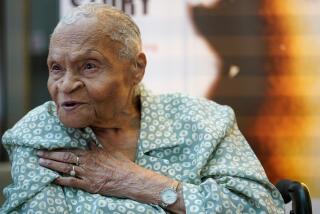One Small Step for Justice in Rwanda
- Share via
A federal judge in New York has done what a world of supposedly good intentions has yet to begin: bring a small measure of justice to the victims of genocide in Rwanda.
On April 8, U.S. District Judge John S. Martin Jr. awarded five Rwandans living in the United States $105 million in damages for the murder of their families during the massacre of April 1994. The suit had been brought against Jean Bosco Barayagwiza, a prominent Rwandan, for setting the monstrous carnage in motion.
Although the plaintiffs are unlikely to see a penny of the judgment against Barayagwiza, as he has no financial assets in the U.S., an American court’s resounding condemnation of him sets an encouraging precedent. To date, neither the Rwandan courts nor the U.N. special tribunal for Rwanda has prosecuted a single person for the massacre that claimed the lives of at least 500,000 Tutsis and hundreds of Hutus sympathetic to them.
The case against Barayagwiza is a microcosm of the genocide. Like so many Rwandans, the five plaintiffs lost almost every family member, from infant nieces and nephews to elderly parents. Louis Rutare, for example, lost his brother, Francois, Francois’ wife, Esperance, and their year-old son. Witnesses saw Francois dig his own grave before he was shot into it; his wife was killed two days later and thrown into a latrine, her baby on her back.
Barayagwiza did not kill these people, but he was just as responsible for their deaths as if he had wielded a machete against them. He was the chief policymaker, ideologue and spokesman of an extremist political party, the Coalition for Defense of the Republic, which was founded to defend the interests of the majority Hutu and scapegoat the minority Tutsi as a means of obtaining political power.
Nearly two years before the genocide, the CDR began recruiting unemployed young thugs to be trained by the Rwandan army in groups of 300. They were paid a small salary and given distinctive clothing in party colors. Army and party officials gave them weapons, including hand grenades and automatic rifles, and later, when the killing began in earnest, encouraged them to manufacture, use and distribute machetes, bows and arrows and nail-studded clubs.
Barayagwiza’s contribution to the genocide went beyond his leadership of the CDR, however. He was a founding director and part owner of an extremist radio station that for a year had saturated the air waves with virulent denunciations of Tutsis in general, exhorting listeners to rid the country of the “traitors” by any means necessary. In the months before large-scale killing began, the radio denounced by name prominent individual Tutsis, including Lando Ndasingwa, who was murdered on the first day of the genocide along with his wife, his mother and his young children. His brother was one of the plaintiffs in the suit.
A factor in Martin’s judgment against Barayagwiza was the testimony in sworn statements that Human Rights Watch collected in Rwanda. The easy availability of such detailed testimonies should shame the United Nations, whose tribunal for Rwanda has yet to prosecute a single case since its establishment in November 1994. The tribunal has indicted a paltry 10 Rwandans for their participation, but only two are in custody and there is no clear date for the commencement of their trials. The U.N.’s failure to fund the tribunal adequately has made it impossible for prosecutors to mount the investigations necessary to move to the trial stage.
The Rwandan government’s record of prosecution is similarly bleak. Though the authorities have jailed 70,000 people (many on the flimsiest of evidence) they have yet to begin a trial. Initially, the scarcity of resources made prosecution impossible. More recently, disagreements within the government on the appropriate form for prosecution and penalty has paralyzed judicial action.
Notwithstanding this very inauspicious start, the plaintiffs have reason to hope that Barayagwiza may yet see the inside of a courtroom. Just a few days before Martin’s judgment against him, Barayagwiza and 10 others were arrested by the government of Cameroon. The charges against him haven’t been revealed, but he is wanted for questioning by the tribunal, and an indictment may follow.
As Martin noted in his solemn ruling, “One cannot place a dollar value on the lives lost as the result of the defendant’s actions and the suffering inflicted on the innocent victims of his cruel campaign.” But he has put a spotlight of shame on the actions of one man and on the international community which has neglected the cause of justice in Rwanda so grievously.
More to Read
Sign up for Essential California
The most important California stories and recommendations in your inbox every morning.
You may occasionally receive promotional content from the Los Angeles Times.









